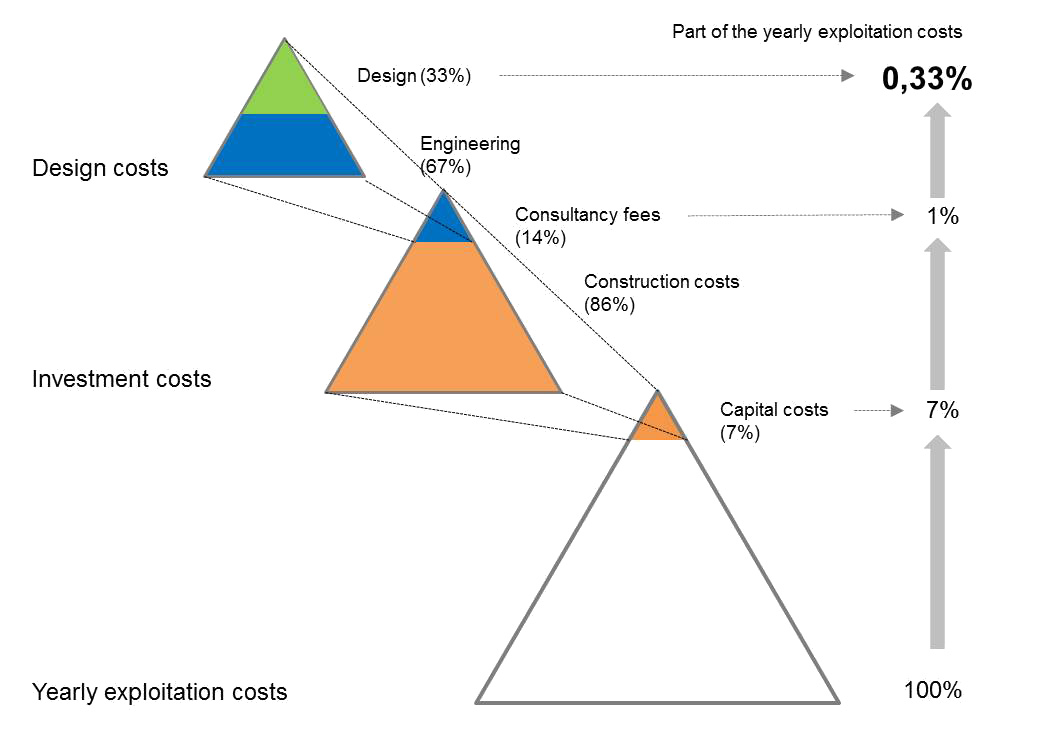Penny wise pound foolish?
Developing a new healthcare facility is not an occasion that arises frequently for most people. If you get this extraordinary challenge you will want to build the best possible facility.
But what is the best? ‘The best’ involves issues such as usability, safety, finance, flexibility, efficiency, sustainability, patient friendliness and so on or probably the perfect balance between all of these aspects. With regard to healthcare facilities the Dutch are famous for their ability to create high-end facilities that are efficient, well-functioning, comfortable to stay in and built within one of the lowest budgets of the Western European countries. This requires an elaborate design based on a thorough analysis of what building is really required in each particular development. As an example it is astonishing what the influence of information technology has had on providing healthcare. Extending this development to the future it will be even more amazing to see how this will influence healthcare organizations. The results it will have a great effect on healthcare facilities.
Designing healthcare facilities requires one to have a vision of conceivable scenarios in the future. The design should also prove to be able to adapt to such eventual developments. In the current rapidly changing society predicting the future of healthcare might be the hardest thing to do. Incorporating flexibility at all levels of detail in your healthcare facility can thus be seen as a must. If this issue has been left out in the design financers who are endeavouring to reduce their risks will certainly let you know.

It is generally known that the cost of real estate in healthcare consumes a minor 7-8% of the total exploitation cost of a healthcare organization. A vast portion of this sum goes towards the doctors and staff and another large amount of money is spent on the use of medical equipment. The building is just facilitating the processes in the organization which also means at the same time that if it does not suite the processes it will inhibit its efficiency. If this hindrance results in, for example, one extra member of the staff (yearly costs of around € 50,000) it justifies an extra investment in the construction costs of €0.5 mln. Economically thinking it is therefore so important to produce a well-thought out brief and design a ultimate flexible building to ensure that it will sustain being a custom-made suit for your organization.
It is therefore interesting to contemplate how healthcare projects are being managed. Generally spoken the focus lies firstly on minimizing the initial costs of the project. Included in this are the design fees. During the development phase of a project the management focuses on restraining the construction costs, one of the targets of the project . It rarely happens that in the in the early stages of a project these construction costs are considered as “just” potential exploitation costs and what the effect of brief and design decisions will have in the long term.
A little exercise on which amount of the yearly costs can really be allocated to the costs of defining the brief and designing the whole facility shows that this is just an almost negligible 0.33%. Even doubling the efforts in achieving a smart building will easily be saved during the period of use of the facility.
Dutch Hospital Design offers you expertise in smart healthcare facilities which are based on a smooth, IT-supported process and ready for all kind of future changes. Call for further information: info@dutchhospitaldesign.com or call to Arnold Burger +316 557 10 150.
How to respond to the future of healthcare
This is the subject of the presentation by Architect Arnold Burger at the international congress of the IMAGINE Institute in Paris on the 4th of November 2014.
The subject of the seminar is: ‘ Hospital and territory, the hospital of the future ‘
More than 200 people are expected to attend the Congress with approximately 20 speakers, including architects, politicians, hospital managers, etc, who will be presenting their views on this subject.
The conference will take place at the IMAGINE Institute located on the campus of the Necker Enfants Malades Hospital in Paris. For more information on this institute please follow this link.